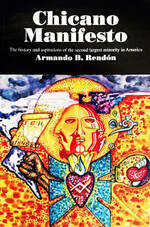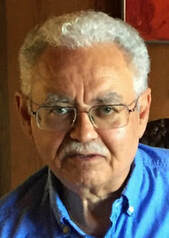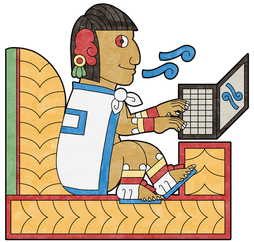THE CUERNAVACA PAPERS, Part 1On August 2, 2018, what might have been the first encounter between Mexican academics and Chicano writers took place in Cuernavaca, Morelos, México, at the Fifth Annual International Conference on “Latin America: Tradition and Globalization in the 21st Century,” hosted by the Universidad Internacional, in coordination with St. Mary’s College of Moraga, California. Professor Álvaro Ramirez, a member of the Modern Languages department at St. Mary’s, the organizer of the conference, asked Armando Rendón, the Somos en escrito editor, if he would be interested in assembling a panel to discuss Chicano literature at the conference. Seizing the opportunity for a first encounter with mexicanos on the subject, Rendóninvited three Chicanan writers to speak on the nature and scope of Chicanan literature and its symbiotic relationship to Mexico in particular and the Américas in general. In order of their presentations, they were Rendón, Rosa Martha Villarreal, Roberto Haro, and Felipe de Ortego y Gasca. Illness kept Dr. Ortego from attending at the last minute but his colleagues stepped in to discuss the main themes of his essay. The presentations are published here as separate features,but under the title, “The Cuernavaca Papers” The Chicano of the AmericasBy Armando Rendón The intent of my remarks is to lay the first few bricks to a bridge between Mexico and the rest of Latin America into the United States. It’s a notion that has threaded my thoughts going back to the early years of the Chicano Movement, the latter 1960s—that the way to span our two-fold worlds is through literature and the other cultural media. In mid-1970, I was in the final stages of completing Chicano Manifesto, the book that has served as a touchstone for many Americans in addressing and understanding issues which impelled the Chicano Movement and the underlying philosophy of chicanismo. After 300 pages of trying to portray what it meant to be a Chicano, I asked, not knowing the answer as I wrote the words: “What does this kind of multicultural intuition promise for the future of the Chicano, of the United States, or of the world.” I remember the answer coming to me out of the blue. I wrote: “Fundamentally, I see the Chicano as the prototype of the citizen of the Americas a century from now.” –We’re halfway there! I went on to develop this thesis, but in no way did I mean that everyone would be a Chicano or Chicana in 2070, but that through the process of osmosis, rubbing cultures together, learning each other’s language, getting to know each other, contending against each other, an “assimilation or distillation” would occur which would allow for our better angels to prevail. Then I ran across this quote from Walt Whitman, written 87 years before my “prophecy:” Speaking of 1880s America, he stated: “Character, literature, a society worthy the name, are yet to be established. To that composite America of the future, Spanish character will supply some of the most needed parts. No stock shows a grander historic retrospect, grander in religiousness and loyalty, or for patriotism, courage, decorum, gravity, and humor.” (From a letter dated July 20, 1883, Camden, NJ., 135 years ago almost to the day) The term, globalization, had not been invented yet in 1970, let alone 1883, but Whitman foresaw that the force of contact, of cultural abrasion, and inter-dependency with its neighbors to the South would serve the Anglo American society best by civilizing it, unless whites succeeded in wiping out the indigenous peoples and Hispanic colonizers, who had preceded the European incursions.  Here’s what I figure: Whitman did not define what he meant by “Spanish:” we probably all looked alike to him even though by the 1880s, Mexico was a mestizo nation. The Chicano embodies that mestizo character Whitman perceived but also has the advantage of having lived and survived in the belly of the beast at least since the Treaty of Guadalupe Hidalgo ended the invasion by the U.S. of this, our mother country. Of course, Mexico and all the countries to its South have borne the savagery and greed of its neighbor to the North for centuries. But generally, Latin America, as a geo-political montage in the Western Hemisphere, has not had to cope with the threat and familiarity of the White Anglo society on a daily basis, generation after generation. This is where the Chicano comes in: we know the Anglo American society better than it knows itself. It does not know us yet, us Chicanos, Latinos, Hispanics, whatever they may call us. Remember the terms, Latino and Hispanic, were stamped on us by government agencies. Today, certain demagogues, in the shadow of racists going back to the likes of James K. Polk, have painted Latinos, to use the most generally familiar term, as invaders, murderers, rapists, though “there are some good people.” Thus, the indigenous-hispanic character is persistently portrayed as immigrant, ignorant and debased, racially inferior, unable to deal with lofty affairs, let alone help to run the country. Mr. Whitman, where are you? ¿Dónde está?  Walt Whitman, 1887 Walt Whitman, 1887 In spite of the demeaning history books, of ill-intentioned political motivations, of a racism evolved over half a millennium at least and sustained for the sake of maintaining white supremacy, we have survived. We have contributed great minds, awesome musicians and artists, terrific baseball players, and significant literary works. We are about the task of civilizing America, never mind its current leaders. Which brings me to my central point: The notice about this conference suggested that Latin American literature basically ends at Mexico’s border with the U.S. I’m here to make a case for the fact, as I see it, that Latin American literature, broadly understood, extends into the U.S.A. The potential exists for “Latin America” to grow even stronger politically, economically and culturally by recognizing not only the presence of Chicanas and Latinas in the U.S. but our growing influence on America and the significant role we can play in the evolution of an even more glogal presence for the peoples of Latin America. For future conferences such as this one, perhaps the emphasis should be placed on uniting the Latin Americas through the arts, culture and literature. The Chicano, I believe, is the link to the future for a stronger collaborative effort. Or, put another way, there can be no role for Latin America in a globally connected world without embracing and coalescing with the indigenous-hispanic peoples in the U.S. How can Mexico, let alone Latin America, engage in affecting the nature and direction of globalization, if it skips over the 61 million indigenous-hispanic Americans of the U.S.A. We have been the principal driver of U.S. demographic growth since 2000, accounting for half of the population growth in the U.S. And about two-thirds of these are of Mexican origin. Our median age in 2015 was 28, up from 25 in 2000, but Whites had the highest median age, 43, in 2015. (From Antonio Flores, Pew Research Center, September 18, 2017) What we here propose is that a beginning point is in the written word, in literary endeavors, in inter-American tertulias. It is in poetry, the novel, the short story, and critical writing that greater understanding and collaboration can evolve. To sum up, while we are concerned with globalization as a geo-political phenomenon and worldwide evil, I urge that Mexico –perhaps at this most timely change of leadership here– look to the north and refocus its view of Chicanos and Mexican Americans as partners, compatriotas, and joint creators of a new society, a new global standard of “patriotism, courage, decorum, gravity, and humor.”  Armando Rendón, a native of San Antonio, Texas, is the author of Chicano Manifesto (1971, 1996), author of the award-winning The Adventures of Noldo book series and the founder/editor of “Somos en escrito The Latino Literary Online Magazine.” He lives in the San Francisco Bay Area.
0 Comments
|
Archives
June 2024
Categories
All
|
Donate and Make Literature Happen
is published by the Somos En Escrito Literary Foundation,
a 501 (c) (3) non-profit, tax-exempt corporation. EIN 81-3162209



 RSS Feed
RSS Feed